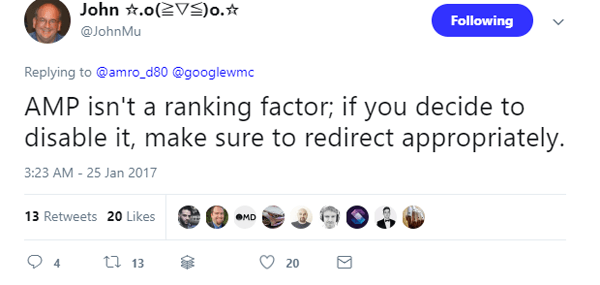Now Are You Ready for AMP?

by Amberly Dressler
16 Jan, 2023
By now you have likely heard of Google's Accelerated Mobile Pages (AMP) program. What, however, have you done about Google's open-source initiative to "make the Web better for all," anything?
Since it was announced in Oct. 2015, Web professionals like you have likely wondered whether accelerated mobile pages would be fully realized and whether you had to get involved or not. Let's tackle some top questions about the initiative to determine whether you're ready to get started:
Are You Only Looking for a Rankings Boost?
If so, you will likely be disappointed with whether your accelerated mobile pages will help with search engine result page (SERP) positioning for your website on a whole (Google says AMP is not a ranking factor).

That said, there are examples that AMP provides some search ranking benefits and there may be some residual effects of your pages loading faster (although speed is said to not be a factor in mobile search, yet).
The drawback to not embracing AMP, however, is that content will not appear in the AMP carousal - and therefore will not compete against similar content - if the pages are not built through AMP. By exposure alone, there are benefits to how content will appear in the SERPs whether accelerated mobile pages are weighted differently or not (Google says they are not).

Do You Want to Improve User Experience?
If so, then accelerated mobile pages are a good way to do so as they make pages faster ( appearing to load instantly). It's well stated that slow-loading pages frustrate website visitors who may leave to never return. AMP can potentially reduce that frustration, keep visitors on your site longer and, ultimately, help in conversion goals (since the person isn't frustrated, didn't leave and stayed longer).
Do You Have Content Pages?
In a 2016 Google Webmaster Hangout it was stated (around the 46-minute mark) that any website can show in the AMP carousel. This means that those developers/SEOs, who have not given AMP much thought because they are not news and information websites, should pay attention to use-cases for AMP within their organizations. When asked about AMP for ecommerce sites, for example, Google's John Mueller said back in 2016 (to paraphrase) that sure, these sites can use AMP for their blogs or resources section.
Today, Google has published case studies about ecommerce sites using AMP for all their pages to the tune of better conversion rates, lower bounce rates and higher click-throughs from the search engines.
Are You Forward-Thinking?
Like with any third-party platform that influences your website traffic and visibility, it is important to understand what they are prioritizing in order to not be left behind. Mueller, for example, had said last year that he wouldn't be surprised if, over time, Google also got to ecommerce type content to show that a little better as AMP in the search results. Some retailers are now getting the "AMP" label on the search results; it's likely only a matter of time before there is a carousel, perhaps a shoppable one.

Keep Learning:
Since it was announced in Oct. 2015, Web professionals like you have likely wondered whether accelerated mobile pages would be fully realized and whether you had to get involved or not. Let's tackle some top questions about the initiative to determine whether you're ready to get started:
Are You Only Looking for a Rankings Boost?
If so, you will likely be disappointed with whether your accelerated mobile pages will help with search engine result page (SERP) positioning for your website on a whole (Google says AMP is not a ranking factor).

That said, there are examples that AMP provides some search ranking benefits and there may be some residual effects of your pages loading faster (although speed is said to not be a factor in mobile search, yet).
The drawback to not embracing AMP, however, is that content will not appear in the AMP carousal - and therefore will not compete against similar content - if the pages are not built through AMP. By exposure alone, there are benefits to how content will appear in the SERPs whether accelerated mobile pages are weighted differently or not (Google says they are not).

Do You Want to Improve User Experience?
If so, then accelerated mobile pages are a good way to do so as they make pages faster ( appearing to load instantly). It's well stated that slow-loading pages frustrate website visitors who may leave to never return. AMP can potentially reduce that frustration, keep visitors on your site longer and, ultimately, help in conversion goals (since the person isn't frustrated, didn't leave and stayed longer).
Do You Have Content Pages?
In a 2016 Google Webmaster Hangout it was stated (around the 46-minute mark) that any website can show in the AMP carousel. This means that those developers/SEOs, who have not given AMP much thought because they are not news and information websites, should pay attention to use-cases for AMP within their organizations. When asked about AMP for ecommerce sites, for example, Google's John Mueller said back in 2016 (to paraphrase) that sure, these sites can use AMP for their blogs or resources section.
Today, Google has published case studies about ecommerce sites using AMP for all their pages to the tune of better conversion rates, lower bounce rates and higher click-throughs from the search engines.
Are You Forward-Thinking?
Like with any third-party platform that influences your website traffic and visibility, it is important to understand what they are prioritizing in order to not be left behind. Mueller, for example, had said last year that he wouldn't be surprised if, over time, Google also got to ecommerce type content to show that a little better as AMP in the search results. Some retailers are now getting the "AMP" label on the search results; it's likely only a matter of time before there is a carousel, perhaps a shoppable one.

Keep Learning:

Amberly Dressler
Head of analyst relations, public relations, customer advocacy (People Heroes), customer community, content marketing (full funnel/lifecycle), content operations and optimization, reputation management and social media. Leads a team of nine superstars to exceed our goals multi-fold.








